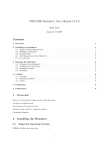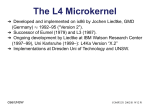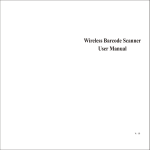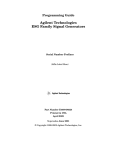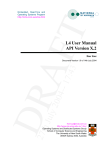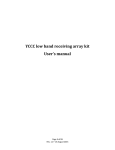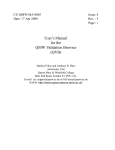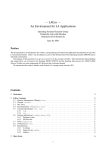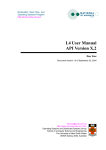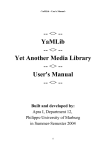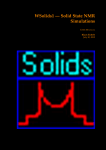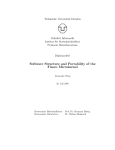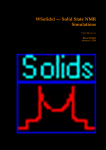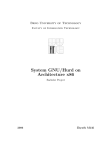Download IDL4 Manual
Transcript
IDL4 Version 1.0.0 User’s Manual Andreas Haeberlen University of Karlsruhe [email protected] April 2003 Preface This manual is still under construction. More information on the technology used in IDL4 can be found in [3]; for more details on CORBA IDL, please read [1] or one of the countless books on CORBA, e.g. [7]. 3 Contents 1 Writing interface definitions 1.1 Basic structure . . . . . . . . . . . . . 1.2 Types . . . . . . . . . . . . . . . . . . 1.2.1 Basic types . . . . . . . . . . . 1.2.2 Constructed types . . . . . . . . 1.3 Exceptions . . . . . . . . . . . . . . . . 1.4 Constants . . . . . . . . . . . . . . . . 1.5 Attributes . . . . . . . . . . . . . . . . 1.5.1 Oneway functions . . . . . . . 1.5.2 Function identifiers . . . . . . . 1.5.3 Mapping fpages . . . . . . . . . 1.6 Advanced features . . . . . . . . . . . . 1.6.1 Local functions . . . . . . . . . 1.6.2 Type import from C++ code . . 1.6.3 Disabling the memory allocator 1.6.4 Receiving kernel messages . . . . . . . . . . . . . . . . . . 7 7 8 8 9 11 11 12 12 12 13 13 13 13 14 14 2 Working with generated code 2.1 Compiling the IDL file . . . . . . . . . . . . . . . . . . . . . . . . . . . . . . . . . . . . . 2.2 Sending requests . . . . . . . . . . . . . . . . . . . . . . . . . . . . . . . . . . . . . . . . 2.3 Processing requests . . . . . . . . . . . . . . . . . . . . . . . . . . . . . . . . . . . . . . . 15 15 15 16 3 Quick reference guide 3.1 Invoking IDL4 . . . . . . . . 3.1.1 Overall Options . . . . 3.1.2 Warning Options . . . 3.1.3 Debugging Options . . 3.1.4 Miscellaneous Options 3.1.5 Preprocessor Options . 3.1.6 Target Options . . . . 19 19 19 19 20 20 21 21 . . . . . . . . . . . . . . . . . . . . . . . . . . . . . . . . . . . . . . . . . . . . . . . . . . . . . . . . . . . . . . . . . . . . . . . . . . . . . . . . . . . . . . . . . . . . . . . . . . . . . . . . . . . . . . . . . . . . . . . . . . . . . . . . . . . . . . . . . . . . . . . . . . . . . . . . . . . . . . . . . . . . . . . . . . . . . . . . . . . . . . . . . . . . . . . . . . . . . . . . . . . . . . . . . . . . . . . . . . . . . . . . . . . . . . . . . . . . . . . . . . . . . . . . . . . . . . . . . . . . . . . . . . . . . . . . . . . . . . . . . . . . . . . . . . . . . . . . . . . . . . . . . . . . . . . . . . . . . . . . . . . . . . . . . . . . . . . . . . . . . . . . . . . . . . . . . . . . . . . . . . . . . . . . . . . . . . . . . . . . . . . . . . . . . . . . . . . . . . . . . . . . . . . . . . . . . . . . . . . . . . . . . . . . . . . . . . . . . . . . . . . . . . . . . . . . . . . . . . . . . . . . . . . . . . . . . . . . . . . . . . . . . . . . . . . . . . . . . . . . . . . . . . . . . . . . . . . . . . . . . . . . . . . . . . . . . . . . . . . . . . . . . . . . . . . . . . . . . . . . . . . . . . . . . . . . . . . . . . . . . . . . . . . . . . . . . . . . . . . . . . . . . . . . . . . . . . . . . . . . . . . . . . . . . . . . . . . . 4 Appendix 23 4.1 Keywords . . . . . . . . . . . . . . . . . . . . . . . . . . . . . . . . . . . . . . . . . . . . 23 4.2 Supported platforms . . . . . . . . . . . . . . . . . . . . . . . . . . . . . . . . . . . . . . . 23 4.3 Supported types . . . . . . . . . . . . . . . . . . . . . . . . . . . . . . . . . . . . . . . . . 24 5 Chapter 1 Writing interface definitions 1.1 Basic structure The specification in an IDL file describes one or more interfaces, which in turn may contain one or more methods. Here is an example: library storage { interface textfile { void readln( [in, out] short *pos, [out, string] char **line ); void writeln( [in, out] short *pos, [in, string] char **line ); int get_pos(); }; }; module storage { interface textfile { void readln( inout short pos, out string line ); void writeln( inout short pos, in string line ); int get_pos(); }; }; IDL4 supports two specification languages, CORBA IDL and DCE IDL, so most example code is shown in both languages; the CORBA code is always on the left side. Note that the syntax is very similar to C/C++, especially in the case of DCE IDL. The most important difference is that every parameter has a directional attribute (in, inout or out). This is used to indicate whether the parameter contains • input data, which must be copied from client to server, • output data, which is returned by the server, or • a combination of both Another difference is the presence of special data types like string, which have additional semantics; for example, string stands for a sequence of characters with a trailing zero, and sequence denotes an array of variable length. These special types are explained later in this chapter. Finally, it is possible to avoid naming conflicts by putting interfaces into modules. For example, a network driver and a postal application might both want to provide a packet interface, possibly with different methods; this conflict can be resolved by using two separate modules. 7 1.2 Types 1.2.1 Basic types Integers IDL4 supports the following CORBA integer types: Type name unsigned short short unsigned long long unsigned long long long long Size 16 bit 16 bit 32 bit 32 bit 64 bit 64 bit Value range 0..65535 -32768..32767 0..4294967295 -2147483648..2147483647 0..18446744073709551615 -9223372036854775808..9223372036854775807 The type int is also supported, although it is deprecated because the standard does not define its size (32 or 64 bit). Currently, it has 32 bit on all platforms. Floating point The following floating point types are available: Type name float double long double Size 32 bit 64 bit 80 bit Value range 3.403 · 1038 1.798 · 10308 1.1897 · 104932 Precision 6 digits 15 digits 18 digits Characters IDL4 supports both the 8-bit char and the 16-bit wchar data types. The type unsigned char may also be used, but it is deprecated. The reason is that in CORBA IDL, characters have special semantics; for example, they might be translated to a different character set by the marshalling code. If you need an 8-bit data type for binary data, you should use the octet type. Flexpages IDL4 supports the L4 mapping primitives by providing a special type named fpage. This type corresponds to the flexpage type of the respective kernel interface; its size is platform-dependent. Miscellaneous Type name boolean octet void Size 1 bit 8 bit undefined Possible values true, false 0..255 none The void data type may only be used for return values or as the base type for a pointer. The Object and any types, which are also defined by CORBA, are not supported. 1.2.2 Constructed types Alias types You can use typedef to create your own types: typedef unsigned short word_t; typedef string<40> max40char_t; typedef long array_t[4][3]; typedef unsigned short word_t; /* Bounded strings not supported */ typedef long array_t[4][3]; IDL4 maps the types in an interface description to the target language and adds a definition to the header files it produces. Thus, you can also use these types in your own code. Sequences CORBA provides a special type for transferring variable-length data, the sequence type. A sequence has a base type (e.g. char) and, optionally, a size bound. Consider the following example: typedef sequence<float, 7> some_t; typedef sequence<char> another_t; /* DCE IDL does not support the sequence type */ The first line defines an array of floats that does not contain more than seven members (but may contain less); the second line defines a character array of arbitrary size. Note that sequences may only appear in typedefs, not directly as an argument type. When using sequences, please consider that IDL4 needs to preallocate buffer space for them. Providing a tight size bound saves memory and considerably improves performance. Note that the sequence mapping in IDL4 differs from the one specified in [2]. In the IDL4 mapping, the programmer is always responsible for the storage allocated for output sequences; the release flag is not supported. Also, output sequence parameters do not use double indirection; instead, they are treated just like ordinary structs. Arrays In DCE, there is no single type for variable-length arguments. Instead, size and location of the data are specified independently. Consider the following example: /* CORBA does not support the length_is attribute */ interface foo { void bar( [in] int len, [in, length_is(len)] float *addr ); void xyz( [in, length_is(5)] short *addr ); }; The stub code for bar transfers len floating point numbers, starting at addr, whereas the code for xyz always transfers five 16-bit integers. On the server side, buffer space is allocated and freed by the stub code. In particular, for out arguments, the stub preallocates enough buffer space and passes a pointer to it when the function is invoked. Nevertheless, your code is not required to use this buffer; it can save one copy operation by returning a pointer of its own. On the client side, the stub allocates buffers for output values, but does not free them. It is your responsibility to invoke CORBA_free() for every array that is returned by the server. Note that the argument to length_is denotes the number of elements, not the size in bytes! Structs Structs are used exactly like their counterparts in C/C++: struct some_t { short a[4], b; float c; }; struct some_t { short a[4], b; float c; }; The stub allocates and frees buffers for the server; on the client side, this is the responsibility of the user. However, CORBA_alloc() is not used because structs have a fixed size; instead, for an out parameter, the user supplies a pointer to an existing struct, which is then overwritten by the stub. Unions Unlike C/C++-style unions, a CORBA-compliant union needs a special member, the discriminant, which is used to decide which type the union currently contains. This is important because different types are usually marshalled differently. Consider the following example: union U switch (int) { case 1 : long x; case 2 : case 3 : string s; default: char c; }; union U switch (int a) { case 1 : long x; case 2 : case 3 : string s; default: char c; }; If the discriminant, which is always named _d in CORBA, has the value 1, then one 32-bit value needs to be copied. When _d is 2 or 3, however, the union contains a pointer, which must be dereferenced, resulting in a string to be transferred. Note: Unions are not yet available in the current IDL4 release! However, C/C++-style unions are supported. Such a union is always copied directly and entirely; thus, it may not contain types with special semantics, such as strings. Strings CORBA supports 8-bit and 16-bit strings with an optional length bound; strings are always terminated by the value zero. Consider the following example: typedef string<20> s20_t; /* No bounded strings in DCE */ interface foo { void bar( in string a, inout s20_t b, out wstring<40> c ); }; interface foo { void bar( [in, string] char *a, [in, out, string] char **b, [out, string] short **c ); }; The first argument to foo::bar is an 8-bit string of arbitrary length, whereas the second argument may contain at most 20 characters; the third argument is a 16-bit string of not more than 40 elements. The first two arguments are terminated by a zero byte, the third one ends with a 16-bit zero value. On the server side, strings are managed by the stubs. For output values, sufficient buffer space is allocated before the method is invoked; however, the implementation is free to move the pointer to another buffer. On the client side, the stubs allocate output buffers using CORBA_alloc(), but do not free them; it is the responsibility of the user to invoke CORBA_free() for each one. Fixed point CORBA includes a special type for fixed-point, BCD-coded numbers. This type is not supported by IDL4 . Bitfields IDL4 supports C/C++-style bitfields. These are allowed neither by CORBA nor by DCE and should be used with care, because they are highly platform-dependent. Consider the following example: struct long long long }; msgdope_t { cc : 8; parts : 5; mwords : 19; struct long long long }; msgdope_t { cc : 8; parts : 5; mwords : 19; 1.3 Exceptions Currently, only the CORBA exception handling is supported by IDL4 . In CORBA, there are two classes of exceptions: system and user-defined. System exceptions may be raised by any method (e.g. when the IPC fails or a timeout happens), whereas user-defined exceptions must be explicitly specified by the interface description. Consider the following example: interface file { exception access_denied {}; exception not_found {}; /* DCE exception handling not supported */ void open(in string name) raises (access_denied, not_found); }; This means that the method file::open can, in addition to system exceptions, raise two user-defined exceptions named access_denied and not_found. CORBA also allows exceptions to contain additional information; for example, it may be useful to add a message for the user, or details on how to correct the error. Here is an example: interface file { exception access_denied { string reason; int missing_privileges; } /* DCE exception handling not supported */ void open(in string name) raises (access_denied); }; Note: Currently, IDL4 only supports exceptions without additional information 1.4 Constants It is possible to define constants within an interface. The constants are added to the generated header files, but may also be used within the specification itself. Consider the following example: interface foo { const int addr_size = 6; struct hwaddr { octet mac[addr_size]; }; }; interface foo { const int addr_size = 6; struct hwaddr { unsigned small mac[addr_size]; }; }; This causes a constant named addr_size to be exported to the client header file; also, the struct hwaddr is declared to be six bytes long. 1.5 Attributes 1.5.1 Oneway functions Usually, a remote procedure call consists of two phases: A send phase, in which the client sends a message to the server, and a receive phase, in which it waits for a reply. However, in some cases, it is necessary to omit the second phase, e.g. when the request is to be processed asynchronously, or when no reply is possible. Here is how this behaviour can be specified: interface foo { oneway void bar(in int a); }; interface foo { [oneway] void bar([in] int a); }; Oneway methods must not have inout or out arguments; also, they may neither return a value nor raise any exceptions. Note that when the method returns on the client side, the absence of exceptions does not mean that the request has been processed successfully; it only indicates that the request transfer did not fail. 1.5.2 Function identifiers As interfaces can contain multiple methods, and servers may implement multiple interfaces, the server must be able to tell from the request which method it is intended for. In IDL4 , this is accomplished with numeric function IDs. A function ID has two parts: An interface number and a method number. The interface number is identical for all methods in an interface, whereas different interfaces may be assigned the same number. The method number must be unique within an interface. By default, IDL4 assigns the number 0 to all interfaces; this implicitly assumes that different interfaces are implemented by different threads. If this is not the case, you need to assign the interface numbers manually. The allowed range for interface numbers is platform dependent; typically, numbers of up to 1.000 are supported. Here is an example: [uuid(5)] interface foo { void bar(in int a); }; [uuid(5)] interface foo { void bar([in] int a); }; You can also change the assignment of method numbers by applying the uuid attribute to individual methods. However, this is rarely necessary. 1.5.3 Mapping fpages The L4 IPC primitive supports mapping, which is essentially the transfer of a complete memory page from one address space to another. As a result, the page is shared by both address spaces; write operations in either of them are instantly visible in both. Also, the page may cover the same address range in both spaces, but this is not mandatory. IDL4 supports this primitive with a special data type, the fpage, which describes a memory region; see [4, 5, 8] for more details. fpages are implicitly mapped during message transfer; the mapping persists and is not revoked upon completion of the call. Consider the following example: interface pager { [uuid(0)] void pagefault( in int addr, in int ip, out fpage f ); }; interface pager { [uuid(0)] void pagefault( [in] long addr, [in] long ip, [out] fpage *f ); }; This defines a method pagefault which takes two arguments, the fault address addr and the instruction pointer ip; the server replies with an fpage f which is to be mapped to the client address space. 1.6 Advanced features 1.6.1 Local functions Some L4 microkernels support a special IPC primitive, the local IPC or lipc, which is optimized for intraaddress space calls [6]. This feature can be used with IDL4 as follows: local interface foo { short bar( in short a, in short b ); }; [local] interface foox { short bar( [in] short a, [in] short b ); }; The local attribute indicates that the methods in this interface will only be called via lipc. This permits IDL4 to apply considerably more optimizations; for example, lipc will be used by both client and server stubs, and parameters may be passed by reference. Possible applications include semaphore servers or dispatcher threads, which are used for distributing incoming requests to multiple worker threads in the same address space. Note: This is an experimental feature in the current release! 1.6.2 Type import from C++ code Usually, interface specifications should contain definitions for the data types they use. However, it may sometimes be convenient to import additional data types from the application code. IDL4 supports this with a DCE-style import statement: interface foo { import "l4/x86/types.h"; interface foo { import "l4/x86/types.h"; void bar(in l4_taskid_t tid); }; void bar([in] l4_taskid_t tid); }; This makes available the types defined in l4/x86/types.h to all the methods in interface foo; contains a gcc-compatible C++ parser for this purpose. At compile time, the header file is scanned, all global type definitions are imported and converted into IDL. Note that unlike types defined directly in IDL, the generated header files do not contain definitions for imported types; instead, an #include directive referring to the original file is added. IDL4 1.6.3 Disabling the memory allocator By default, IDL4 uses CORBA-style dynamic memory allocation, i.e. it calls CORBA_alloc to reserve buffers for variable-length output values. In some cases, however, the data is expected at a specific location, which requires an additional copy on the client side. To avoid this problem, you can use the prealloc attribute. Consider the following example: interface foo { typedef sequence<long, 100> buf; void bar( [prealloc] out buf x ); }; interface foo { void bar( [out, prealloc, length_is(len)] char **data, [out] short *len ); }; No dynamic buffers are allocated in either case. Instead, you must explicitly provide a buffer by initializing x._buffer or *data, respectively. Also, you must supply the size of the buffer in x._maximum (or *len in the DCE example). While prealloc should be used for individual arguments, a command line option is also available which disables dynamic allocation for the entire file. 1.6.4 Receiving kernel messages In the L4 world, exceptions are mapped to IPCs, which are sent by the kernel on behalf of the faulting application, e.g. to its pager. These messages can be received by IDL4 stubs when special interface definitions are used. The following interface handles X0-style page faults, which are e.g. generated by the Hazelnut kernel: interface pager { [uuid(0)] void pagefault( in long addr, in long ip, out fpage p ); }; interface pager { [uuid(0)] void pagefault( [in] long addr, [in] long ip, [out] fpage *p ); }; Here is how a V4 page fault is specified (e.g. for the Pistachio kernel): interface pager { [kernelmsg(idl4::pagefault)] void pagefault( in long addr, in long ip, in long privileges, out fpage p ); }; interface pager { [kernelmsg(idl4::pagefault)] void pagefault( [in] long addr, [in] long ip, [in] long privileges, [out] fpage *p ); }; Note that in this case, the fault type (i.e. the requested privileges) is provided as a separate argument, whereas in the upper example, it is encoded in the lower two bits of the fault address. Chapter 2 Working with generated code 2.1 Compiling the IDL file IDL4 can generate three types of output from a given interface description: • Client stubs, which are linked with every client application, i.e. every application that needs to invoke methods from the interface • Server stubs, which are used by every server that needs to implement the interface. • Server templates, which essentially contain a dummy implementation for the interface. They can be used as a starting point for writing a server. Usually, the first two kinds of output are generated during the compilation process, whereas the third is only generated once and then extended with user code. You can select the kind of output by supplying -c, -s or -t on the command line, respectively. For example, idl4 -ix0 -pia32 -ffastcall -s pager.idl -h pager-server.h generates a header file called pager-server.h which contains all the server stubs for methods in pager.idl. Also, the X0 backend for the IA32 platform is selected, e.g. because the application will use the Hazelnut kernel and run on a Pentium-III processor. Finally, the fastcall option is given, which allows IDL4 to use nonstandard system calls, in this case, the sysenter instruction. 2.2 Sending requests As specified by the CORBA C language mapping [2], client stubs have two implicit parameters (i.e. parameters that are not defined by the interface). Consider the following example: module storage { interface textfile { void readln( inout short pos, out string line ); }; }; library storage { interface textfile { void readln( [in, out] short *pos, [out, string] char **line ); }; }; 15 When this definition is compiled with the -c option, IDL4 creates the following client stub: void storage_textfile_readln( storage_textfile _service, CORBA_short *pos, CORBA_char **line, CORBA_Environment *_env ) The first parameter, _service, contains the thread ID of the server where the request is to be sent. Unlike other CORBA code generators, IDL4 does not provide a way to obtain this automatically; it assumes that this functionality is implemented by your system. The last parameter is a pointer to a CORBA_Environment structure. This structure contains additional information related to the call, such as a timeout value or a memory window for receiving mappings. You must initialize this structure before invoking the call. An invocation of readln could look like this: #include <storage_client.h> void test(l4_threadid_t server) { CORBA_Environment env = idl4_default_environment; short pos = 100; char *buf; storage_textfile_readln(server, &pos, &buf, &env); switch (env._major) { case CORBA_SYSTEM_EXCEPTION: printf("IPC failed, code %d\n", CORBA_exception_id(&env)); CORBA_exception_free(&env); return -1; case CORBA_USER_EXCEPTION: printf("User-defined exception"); CORBA_exception_free(&env); return -1; case CORBA_NO_EXCEPTION: break; } printf("Read: %s\n", buf); CORBA_free(buf); } Note how env is initialized with an IDL4 -supplied default value, which means a timeout of infinity and an empty receive window. Also, the example shows how environment structure can be used to determine whether an exception occurred during the call, and what type it was. Finally, it is important to always release storage allocated by the stubs (e.g. exceptions, output strings, ...) with the appropriate function. 2.3 Processing requests The standard server loop, which is included in the server template, mainly consists of two macros: • idl4_reply_and_wait, which sends any pending replies and then receives one incoming request, and • idl4_process_request, which analyzes the request and calls the appropriate implementation function Between those macros, you can insert additional code, e. g. a permission check. The second macro uses a function table to decide which function should handle the request; it takes the method number as an argument and uses it as an index into the table. Table entries which correspond to unassigned method numbers contain a reference to the discard function of the interface; thus, this function is only called when a malformed request was received. The server template file also contains function templates for every method in the interface. For the example interface from above, the following template is created: IDL4_INLINE void storage_textfile_readln_implementation( CORBA_Object _caller, CORBA_short *pos, CORBA_char **line, idl4_server_environment *_env ) { /* implementation of storage::textfile::readln */ return; } IDL4_PUBLISH_STORAGE_TEXTFILE_READLN( storage_textfile_readln_implementation ); Similar to the client side, the function has two additional parameters. The first parameter, _caller, contains the ID of the thread that has sent the request, whereas the last parameter, _env, points to an internal data structure. Many functions in the IDL4 runtime need a pointer to this structure, for example the function CORBA_exception_set, which is used to raise exceptions. Please note the macro at the end of the function. This macro makes the function accessible to the server loop; for the optimizations to work, it is also very important that this macro is included after the implementation function. Unlike the client side, memory allocation on the server side is mostly handled by the stub code, that is, you do not need to call CORBA_free, except if you explicitly allocated additional buffers. The stub code preallocates a buffer for every out value and passes a pointer to the implementation function in the respective argument. However, for large buffers (such as strings), you can save one copy by overwriting the pointer with another one pointing directly to the data you want to send. If you decide not to send a reply at all, you can use the idl4_set_no_response function. In this case, the stub code will discard any inout or out values and skip the send phase; instead, it will directly receive another request. Chapter 3 Quick reference guide 3.1 Invoking IDL4 IDL4 is generally invoked in the following way: idl4 [OPTIONS] input.idl The following sections contain a more detailed description of the individual options. 3.1.1 Overall Options -c -s -t These options are used to control the kind of output. The following output types are available: • Client stubs (-c) are used by client tasks to invoke a service • Server stubs (-s) contain functions to receive and dispatch incoming requests on the server side • Server templates (-t) can be used as a starting point when implementing a new service. They contain function prototypes and a simple server loop. -o filename.c Place code output in filename.c. Note that for some mappings, the stub code is contained entirely in the header files. -h filename.h Create a header file called filename.h. This option cannot be used together with -t, because server templates do not include a header file. -v Print the version number and build date on standard output. 3.1.2 Warning Options -Wprealloc Warn whenever a stub needs to allocate an excessive amount of heap memory, e.g. when an unlimited output string is encountered. -Wall All of the above ’-W’ options combined. 19 3.1.3 Debugging Options -dtest Generate test code. When used with -t, this creates a test application that can run as a root task on the bare microkernel. The code creates a server for each interface in the IDL and then invokes every operation with random parameters. -dparanoid Add even more checks to the test code. For example, test for stack overflow and monitor the message dopes. -dcpp Print each input line as it is read from the C preprocessor. -daoi Dump the abstract syntax tree generated from the IDL file. -dcheck Generate debug output for the semantical analysis and consistency check. -dcast Dump the C abstract syntax tree. -dfids Print the function ID assignment. -dmarshal Show details about the marshalling stage. -dgenerator Analyze the stub generator and the backend. -dimport Generate debug info while importing C++ headers. -dreorder Show details when reordering parameters. -dvisual Add debug output to the server stubs. -d All of the above. 3.1.4 Miscellaneous Options -ffastcall Allows IDL4 to use a non-conforming IPC system call where available. The resulting code is faster, but may not be entirely compliant with the kernel specification. For example, the X0/IA32 backend may use sysenter to invoke the IPC system call. -flipc Enables support for local IPC on X0-style kernels. -fctypes Use ANSI C types instead of the platform-independent CORBA types (like CORBA_long). -fomit-frame-pointer Assume the frame pointer is not used. This option must be consistent with the corresponding gcc option. -fuse-malloc Allows IDL4 to use dynamic memory allocation (e.g. CORBA_alloc). This is enabled by default; if you disable it, you must preallocate buffers for all variable-sized output parameters, such as sequence or string. -fomit-empty-files Prevents files from being generated if they do not contain any code. This is enabled by default. -floop-only In server templates, removes all definitions except server loops. -fmodules-only In server templates, generate code only for interfaces that are defined in a module. These options can also be disabled by using a no- prefix (e.g. -fno-fastcall). 3.1.5 Preprocessor Options -D macro Defines macro in the preprocessor. -I path Adds path to the current include path. The include path is passed to the preprocessor and is also searched when importing types. -Wp,option Passes option directly to the preprocessor. --with-cpp path Use another preprocessor (the default is /usr/bin/cpp) 3.1.6 Target Options -m mapping When generating stub code, use the specified mapping (C or C++). -i interface Produce code for the specified kernel interface. -p platform Optimize for the specified platform (generic is allowed). -w wordsize Specifies the word size in bits (32 or 64) where it cannot be determined from the platform, e.g. in the generic backends. --sys-prefix path Add a prefix to all system include files Chapter 4 Appendix 4.1 Keywords The following strings are reserved as keywords and should not be used for identifiers: all_caches any attribute base_is boolean case char const context default double enum exception FALSE fixed float gather import in include inout int interface l1_only length_is library local long max_size module nocache noxfer Object octet oneway out raises readonly ref scatter sequence short size_is string struct switch TRUE typedef union unsigned uuid void wchar writeable wstring 4.2 Supported platforms This table shows the current status of the individual IDL4 backends. You can select one of these backends with the -i and -p options: Platform IA32 Generic Interface X0 V2 V4 X0 V2 V4 23 Current status Supported Supported; no mapping Supported Supported Supported; no mapping Supported 4.3 Supported types Basic data types short long long long unsigned short unsigned long unsigned long long float double long double char wchar boolean any octet enum ref fpage fixed signed 16 bit integer signed 32 bit integer signed 64 bit integer unsigned 16 bit integer unsigned 32 bit integer unsigned 64 bit integer floating point (32 bits) floating point (64 bits) floating point (80 bits) 8 bit character 16 bit character boolean value wildcard type unsigned 8 bit integer enumeration pointer memory flexpage fixed-point decimal supported supported supported supported supported supported supported supported supported supported supported supported supported supported supported supported - Constructed Types string string<n> wstring sequence<type> sequence<type,n> struct union Object array typedef exception unbounded string bounded string unbounded wide string type sequence bounded type sequence structure union object reference array alias type exception supported supported supported supported supported flat members supported DCE style supported supported supported supported memberless exceptions supported Bibliography [1] Object Management Group. CORBA 2.6 specification. http://www.omg.org/cgi-bin/doc?formal/01-12-35. [2] Object Management Group. CORBA C language mapping. http://www.omg.org/cgi-bin/doc?formal/99-07-35. [3] Andreas Haeberlen, Jochen Liedtke, Yoonho Park, Lars Reuther, and Volkmar Uhlig. Stub-code performance is becoming important. In Proceedings of the First Workshop on Industrial Experiences with Systems Software (WIESS), pages 31–38, San Diego, CA, October 2000. [4] Jochen Liedtke. Lava nucleus reference manual. http://i30www.ira.uka.de/publications/pub1998/ln-86-21.ps, March 1998. [5] Jochen Liedtke. L4 nucleus version X.0 reference manual. http://l4ka.org/documentation/files/l4-86-x0.ps, September 1999. [6] Jochen Liedtke and Horst Wenske. Lazy process switching. In Proceedings of the 8th Workshop on Hot Topics in Operating Systems, Elmau, Germany, May 2001. [7] Jens-Peter Redlich. CORBA 2.0. Addison-Wesley, 1996. [8] The L4Ka Team. L4 X.2 reference manual. http://l4ka.org/documentation/files/l4-x2.pdf, January 2002. 25


























